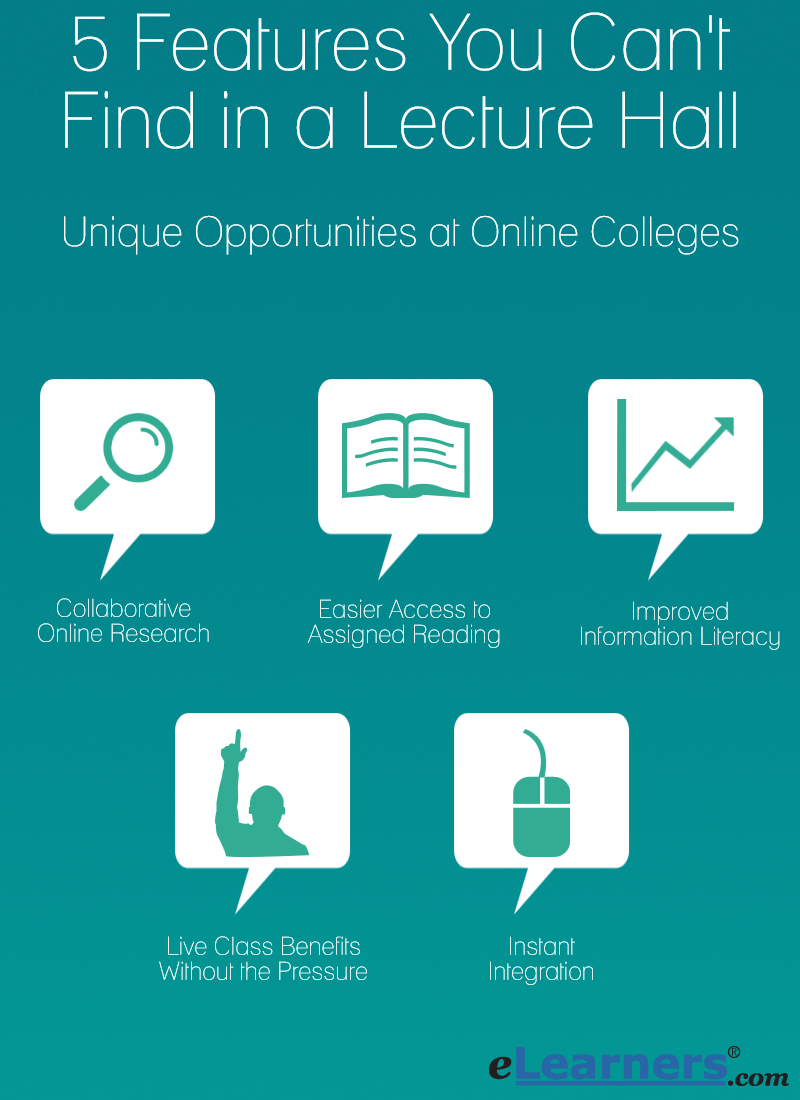 It’s early on Saturday morning. Your family is still sleeping, but you’ve been up for two hours. Remarkably, you’ve already chatted with friends in Florida, Texas, New York, Arizona, Oregon – even Germany.
It’s early on Saturday morning. Your family is still sleeping, but you’ve been up for two hours. Remarkably, you’ve already chatted with friends in Florida, Texas, New York, Arizona, Oregon – even Germany.
This is partly what makes online colleges so amazing. Not only can you “attend” class from home, at a convenient hour, you can also connect with classmates across the country and around the globe. Your fellow online students bring professional experiences and unique perspectives to every class discussion. In the end, you may discover these exchanges are the best part of your online degree experience.
If you’re curious about e-learning’s other advantages, here are five ways online colleges may be more dynamic than the average lecture hall:
Collaborative Online Research
Compared to traditional schools, online colleges may be more likely to encourage collaborative research, where classmates work together to find sources and share knowledge. For example, you might be asked to develop an annotated bibliography, which you post in a class discussion, and then revise with suggestions from fellow students. You might be asked to work on a presentation or portfolio with assigned team members. Besides benefitting from the added support, you may discover that collaborative research is a better example of how groups work together in real-life job settings.
Interactive coursework is a big part of the curriculum at online colleges like Bellevue University and Baker College, where learning groups are common practice. “Cohort” is another term used to describe members of an academic community, all completing the same classes while getting to know each other along the way – kind of like the way you made friends in middle school. Azusa Pacific University and numerous graduate programs use cohort models to enhance the online college experience, not to mention alumni relationships.
Easier Access to Assigned Reading
If you’re taking an online course that involves a digital textbook, your assigned reading may be available in audio files. Instead of sitting still, you could listen to new chapters while you’re walking, running errands, or commuting. Do you usually listen to the radio while you drive? Why not replace your favorite tunes with this week’s lecture?
Allied Schools’ certificate programs in real estate and healthcare are known for using audio/video study materials. Listening to lessons is convenient and extremely effective – especially if you’re an auditory learner. Face-to-face lectures, by contrast, can’t be re-played. Worse, some traditional students are still lugging around eight-pound textbooks or giant folders of photocopied articles.
Improved Information Literacy
Many online colleges offer a “Student Success” course, designed to help new students access resources and complete class assignments. Orientation courses address various topics in technology: how to use computer hardware, software, and multimedia devices (tablets, smart phones, audio/video players). Whatever your college major, these are important lessons to learn. Being comfortable with digital tools extends beyond college and into the workplace, where employers value tech-savvy employees.
If you’re already familiar with basic programs, or if you’re enrolling in a master degree program, your student orientation may feature more advanced applications. St. Mary’s University of Minnesota provides select grad students with an iPad, featuring the school’s customized learning platform and mobile productivity apps. Capella University offers a mobile technology minor for IT students. And most online colleges allow students to complete open electives (individual courses) in web technology or computer basics.
Live Class Benefits Without the Pressure
Let’s be honest: classrooms are intimidating. There’s always the possibility that a teacher may call on you or catch you daydreaming. Older students sometimes feel out of place on a traditional campus, surrounded by twenty-somethings who’ve already formed cliques. Still, many students want to experience real-time learning, where questions are asked and answered in the company of classmates. Online colleges can offer this, too.
National American University’s MBA program offers live Internet sessions that allow synchronous class discussions – even with class members in different cities and states. Certificate programs like those offered by the Allen School combine live interaction with message boards and video recordings. This best-of-both-worlds format means you can sit back, collect your thoughts, and participate with confidence, rather than feeling the pressure of a crowded lecture hall.
Instant Integration
Last but not least, we know that the Internet is a modern miracle. Online tools help college students pull information from videos, newspapers, journals, blogs, maps, and other worldwide sources – all at the click of the mouse. Unfortunately, many traditional classrooms observe an offline policy, preventing students from using cell phones, tablets, or laptops while class is in session.
As an online student, you’ll never be a captive audience. You’ll use multiple channels – maybe all at once – to integrate the challenges and ideas that matter to your education. Maybe you’re drafting a presentation at work that aligns with the unit your instructor is covering. Maybe you just watched a documentary that contradicts your classmate’s stance on a major social issue. Why should these elements be separate from your class discussion? Online colleges allow you to bring life into learning, making both more valuable.
